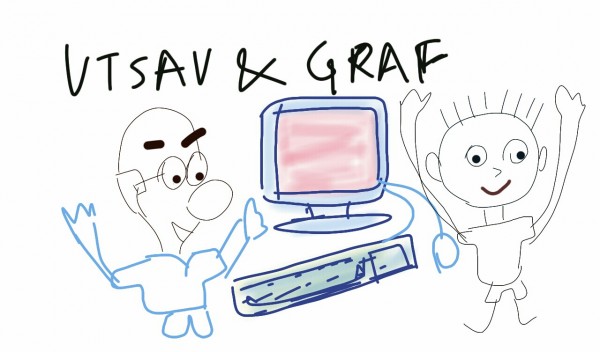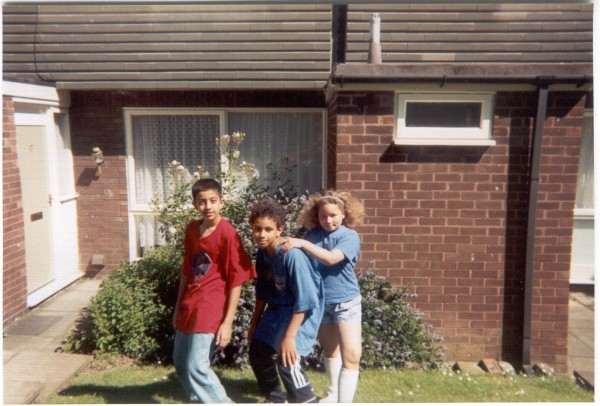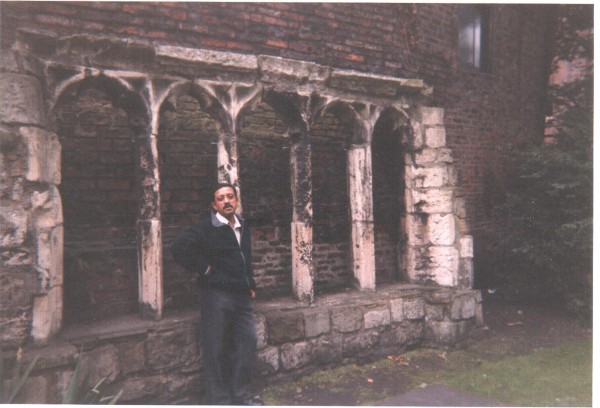This happened in the mid-nineties when I was in York, UK. My wife was there working for her DPhil as a Commonwealth Scholar and I was there with her for a few months to help her settle down and, of course, see as much of that country as possible. We had Pushkin, our son, with us. He was in Class IV then and was adjusting rather well in his new school — Fishergate Primary School.
The one thing that all three of us loved doing was to walk to the University and discover the so many wonders that a computer could be. It was the winter of 1994 and Windows 3.14 had just slipped in and everyone there was rather excited. We too were as until then we were actually struggling with the complex DOS where a lot of commands had to be remembered and practised.
‘Windows is good,’ exclaimed Pushkin, ‘I love Paint and even the internet.’
‘Yes, it is easier than remembering all the Ctrl-Cs and the Ctrl-Vs,’ I replied with a smile. I was just not going beyond the very basic commands that the DOS system wanted you to remember and Windows surely appeared attractive and much easier to master. This we did and soon enough, Pushkin came up with a request that any kid of his age would. He simply placed his demand, ‘We need to buy a computer now.’
‘Not possible,’ said Specky, who knew that even the generous scholarship amount would hardly be enough to pay for a brand new machine. She continued, ‘You can keep coming to the University and sit in the Computer lab or even in my office for as long as you wish.’
Now this is precisely what we were already doing. We spent our evenings as well as much beyond that in the University and, mind you, that was the biggest thrill we ever got. It was during this period that Pushkin told me a story that he had been making up in his own mind. The story of Utsav and his grandfather.
‘Let’s write a short-story,’ he told me as we sat in the computer lab of Vanbrough College at the University, ‘maybe this will make mummy buy me a new computer.’
I smiled and agreed to his plan. this is what we wrote… and it took us just a few hours in the lab. More time was spent struggling with the formatting of the text on Corel WordPerfect than on the dialogues and the story content.
Just two days back, and it was a Saturday, stepping out of his school-bus Utsav noticed that his grandfather, or graf as he called him, was tickling his chin with a leaf. Utsav smiled and said, “I have seen, I have seen you play with a leaf that is green.”
(‘Why Utsav?’ I asked.
‘Because we are going to write a story on a celebration,’ Pushkin answered, ‘I’m going to celebrate the day we buy our PC.’)
Graf looked up surprised, though with a grin that was usual, replied, “You’ve … have you noticed that what you said is a poem.” Graf always spoke in a slow gruff voice. Utsav began to think it was because he was silent for such along periods each day that his vocal cord had forgotten the shriller notes. But he loved his voice and enjoyed listening to him.
(Pushkin insisted that ‘graf’ be the word to represent grandfather)
“Is it, graf?” asked Utsav hurriedly after the pause during which he had been thinking of how a simple sentence could actually sound like a poem.
“It is … and a pretty one too. Just the beginning though.”
“Aw, but I’ll surely be unable to go further.”
“Why not?”
“Not without a computer. It is so friendly.”
“There we go again Utsav. You know it should be useful to all.”
“It will be, graf. Even for you. But let’s forget it for now. You were telling me something about a poem.”
“Yes. Ah yes… one of the easiest forms of poetry is the limerick. To write it we …” Graf explained to Utsav some of the techniques of limerick-writings they crossed the road and walked slowly back to their flat in Eliot enclave in North Delhi.
As they entered the enclave, Utsav exclaimed, “Have you noticed, graf, that our enclave has five blocks of flats,” and then with a look that demanded a pat, added , “ like the five lines in a limerick.”
“You are a bright one,” agreed graf, and waving to where the third and the fourth blocks were, “No kids in those blocks … so much like the lines that are shorter.”
Utsav laughed at this analysis, with graf joining him, as they entered their flat.
Utsav washed and then changed his clothes in a rather hurried and lost-in-thoughts manner as graf prepared a spread and cucumber sandwich for him. This was their routine and they never budged from it. Utsav’s parents worked for a large multinational company and were back usually late every evening. So U-n-G, as they playfully called their twosome, always had three to four hours to themselves and they spent that time plat=playing chess, sharing jokes, telling each other what had happened that day, and of course, tossing-in a bit of study.
But that Saturday was special. Utsav sat down to write his limerick as graf struggled with an encyclopaedia for information to help him complete his article. Graf wrote for his club journal but this time he was planning an article for a National Daily.
Watching him making notes Utsav chuckled and said, “You are going to be famous, graf, once this article is published.”
“Everything must begin somewhere ”, replied graf wearily.
“What will you do once you have finished writing your piece?”
“It will have to be typed.”
“And then?”
“Corrections made…. and then retyped. The editor needs it on Monday evening.”
“How I wish you had a computer ”, enthused Utsav. Then he noticed the puzzled-on-the outskirts-of-comical look on graf’s face, and decided to carry on, “We have computer classes in regularly at school… but it isn’t enough. I really want to make my own programmes in QBASIC, I really do wish to, you see… and I’ll be able to do it only if we have a computer at home.”
(Pushkin had already begun his experiments with QBasic on his own and insisted that this be introduced in the story. I was and am still totally ignorant of any programming languages that one uses on the PC)
Despite the dreamy look on his face, despite the long sentences and the impressive pauses, graf just managed to say, “A pen between your fingers is the best stimulation for a writer. A pen and a page is all one needs… and compared to them a computer is so expensive… even for those who understand them. I don’t.”
Utsav was quick to help him, “I’ll teach you all that you need to know. And I’m telling you graf, they really help you write…” He broke-off in mid sentence sensing that graf had stopped listening.
Only for a brief moment did graf look up, and peering into Utsav’s eyes, said in a busy tone, “Let us see if you are able to complete that little limerick… with just a page and a pen.”
Utsav opened his pen and started making a few doodles on the page in front of him. Pausing, he noticed that the doodles somehow looked very much like the weapons of a stone-age man. Funny, he thought, what am I doing and what I am wishing for are ages apart. Just then another thought hit him — and so hard was the hit that with his left hand he felt the back of his head for possible bumps. There weren’t any, of course. So Utsav went back to the thought and was surprised at the easy complexion of the solution it offered.
‘It is simple’ — his thought said seriously — ‘when you want what you want, take it by surprise. That’s what the weapons mean. Even the stone-age man believed in it.’
“ It is simple,” Utsav mimicked his thought in a whisper, “I too will surprise graf.”
Then Utsav went back to the limerick experiment. It took well over an hour to write just five lines and that was when he realised why graf always insisted on silence when he wrote. Quietly then Utsav went and stood by graf’s side.
“Yes,” asked graf, “I gather you have written something.”
“My first limerick is complete,” gushed Utsav. The limerick was then analysed, suggestions made and accepted and then Utsav rewrote it on a fresh page.
That was when graf said, “ Why don’t you read it out for me ?”
“I was waiting for you to say that,” replied Utsav, and then without losing another moment, started reading it,
“Like leaves with smiling tones of green
Or merging hues of all that’s been
School life is bright
And this insight
I wish could live, though as a dream.”
(Ah! this limerick was entirely mine… and thank God, Pushkin simply loved it.)
There was a pause and Utsav seemed to have been mesmerized by his own words. Just then he was emerging into the world as we know it, graf clapped his hand lightly, but said nothing. Though Utsav could notice a clear refracting film of admiration brimming in his eyes.
The evening passed and so did the next day. Late evening on Sunday, graf was busy giving final touches to the typed coy of his article. Utsav hovered around all this while though it wasn’t until graf had put down his pen and sighed audibly that he spoke, “Don’t you think there should be a copy for everything, graf ?”
“Yes. But it is dark and the market is far.”
“Why don’t you read it aloud. If needed we will be able to remember all the important bits surely.”
Graf smiled indulgently and said, “What will I ever do without you?”
Then he started reading it aloud for Utsav.
Later that night when people all over the world where night was, must have slept, U-n-G refused to dream anything but their own special dreams. None other would do as both of them believed that drams do come true.
Monday morning was full of what Utsav called the “Monday morning crush”. Everyone always appeared quashed between groans, alarms, ringing doorbells and the hands of the clock. Utsav didn’t know what all happened in his absence but he always imagined a sudden silence after he had left and his thought bubble graf was waiting at the bus-stop for his return. And sure enough, even today he was there at the bus-stop to greet him. But as he alighted from his bus, Utsav noticed that graf was not his usual self.
“What’s the matter, graf ?”
“Nothing much … but I was waiting for you to come. You’ll have to help me.”
“Help you? Sure. But how?”
“Come, let’s cross the road first. Then I’ll tell you all”.
Graf was walking faster than normal which meant that what he wanted to tell was urgent, so Utsav simply increased his pace too and turned his face to an attentive angle.
“I seem to have misplaced that article …”.
“The one that needed to be retyped?”
“Yes. I have looked everywhere. I rang up your father’s office and he too hasn’t taken it mistakenly.”
“And mummy too hasn’t seen it?”enquired Utsav.
“Yes, I rang up her too.”
There was an uncomfortable bridge of silence before graf spoke, “I rang up the newspaper office to ask for some time but they say it has to either this evening or never… so I have a plan.”
“Plan?” asked Utsav, as they entered their flat.
“That’s my only hope Utsav,” said graf, and after a pause, continued, “My dream now rests on how much you remember of the article I read out aloud last evening.”
Utsav closed his eyes and thought for a while. As he opened his eyes he saw graf enter their study.
Without waiting for his answer, graf called out, “I’m waiting for you. We’ll both try and remember bits … there’s still time… and I know we’ll make it.”
“Yes graf, that’s for sure. But I too have a plan.”
“Tell me your plan.”
“I’ll stand behind you and concentrate on the back of your head. Our teacher says that all that is read goes to the back of one’s mind.”
“Alright. Do it any way you want,” smiled graf.
“That’s the best thing I like about you, graf. You never grovel.”
As graf poised an attentive pen on an eager page, Utsav quietly opened his bag, pulled out his big practical note-book and took out a stapled bunch of printed sheets.
“Come on Utsav, what’s the delay? Try and remember the start.”
“Sure,” said Utsav, and glided to graf’s side. Graf looked up.
“With love, from the back of one’s mind,” Utsav smiled as he placed that bunch of printed sheets in front of graf.
“What’s … ,” started graf, but then his eyes followed his finger as it raced across each line until the last word whizzed past.
“Help me Utsav,” requested graf in a faint voice, “What is this magic?”
“It was me, graf, who took your article to school,” sais Utsav in a straight tone. Then he went on to tell him how he had managed to type the article on to the school computer with the help of two of his friends. “We also spell-checked it .. And we put word-count on the top … and your name and address … and the title in bold …,” Utsav was finding it hard to stop, but had to when graf touched his forearm lightly.
“Thank you,” said graf softly, “This article looks better now.”
After this the rest of the afternoon was full of bustle of seeing the article off to its destination.
That same night the editor rang up personally and talked to graf for over ten minutes.
“You’re going to be famous,” whispered Utsav to graf.
“Yes,” graf whispered back, then he straightened his back, walked up to Utsav’s study table and pointed to the untidy pile of books on it, and said, “You can’t get away from it now. This table has to be cleared … we need space.”
“I don’t understand, graf,” said Utsav apprehensively.
“You’re going to have your own computer soon.”
“Isn’t that great!!” Utsav and graf shouted together.
The end of the story was rather predictable but surely not tame and flaccid. I read and re-read and so did Pushkin… and we decided together that the story had come out rather well. I then started reading out the story and used a gruffer, guttural tone for all that graf spoke… and Pushkin seemed fascinated.
‘The story seems much better when you’re speaking it.’
‘Well, the spoken word has its own advantage.’
We couldn’t tape my voice then as we did not have a tape recorder then… but I’ll surely upload an MP3 file if I’m able to tape the story in the right accent… though that may take some time. I realised though that I was the bigger gainer through that collaboration then as I actually began taking an active interest in the creative writing form. pushkin, of course, is now an architect and is in London.
This post is an entry for the Kissan Get Real Contest on Indibloggger.
Arvind Passey
14 March 2012











